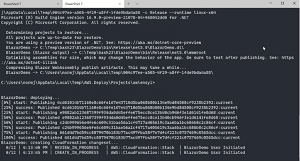News
AWS Previews Deployment Tool for .NET Web Apps, Blazor WebAssembly
Amazon Web Services (AWS) announced a developer preview to ease the process of deploying .NET web apps on the cloud platform, which has become more complex with the advent of tech like Docker and serverless joining the ever-growing .NET ecosystem.
Specifically, the cloud giant announced the first preview of the open source AWS .NET deployment tool for the .NET CLI.
The project's GitHub site describes it as opinionated tooling designed to help even users with little AWS knowledge deploy .NET app. It states: "The tool suggests the right AWS compute service to deploy your application to. It then builds and packages your application as required by the chosen compute service, generates the deployment infrastructure, deploys your application by using the Cloud Development Kit (CDK), and displays the endpoint."
According to a March 17 blog post, it supports both C# and F# code and works with:
- .NET Core/.NET 5 web applications
- Backend services
- Blazor WebAssembly
 [Click on image for larger, animated GIF view.] Deploying a Blazor WebAssembly App in Animated Action (source: AWS).
[Click on image for larger, animated GIF view.] Deploying a Blazor WebAssembly App in Animated Action (source: AWS).
Being "cloud native," the supported apps run on Linux-based virtualized compute services so developers don't have to mess with legacy Window baggage.
That means the tool does not work with:
- .NET Framework (for those apps, there's the .NET Porting Assistant)
- Desktop
- Xamarin
- Other Windows-native applications
It also doesn't support .NET AWS Lambda functions, but that tooling is going to get baked in eventually.
AWS said it has been soliciting customer feedback on how to up its .NET app deployment game in view of the increasing complexity of both AWS and .NET environments, which apparently made the process too hard to do with existing tools.
The team found that the feedback could be summarized in three common questions:
- What's the right service for my application? AWS has an abundance of compute services, and, if you are new to AWS, sometimes it's hard to know which one to use.
- How do I reduce the learning curve? Once you select a compute service, there is still a lot to learn in order to build, package, and deploy your application. It's often both overwhelming and time consuming.
- How do I promote the best deployment practices within my team? Deploying from Visual Studio is great for prototyping and initial testing. However, once customers move beyond that phase, they want to promote their organization's best practices across the teams by using automated deployments.
That caused a 180-degree shift in its approach. "Instead of providing a plethora of tooling for each of our compute services, we want to have a single tool that starts with the .NET application; a tool that provides an opinion and guides you to the right service for your application."
AWS noted that the developer preview mainly addresses the first two items on that feedback list above, with the second item, "How do I promote the best deployment practices within my team?" being tackled with the AWS Cloud Development Kit (CDK). That experience will be totally managed at first, but later will be opened up to let developers get a better handle on the features and functionality.
For more information:
About the Author
David Ramel is an editor and writer at Converge 360.